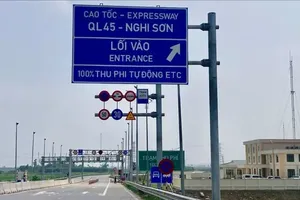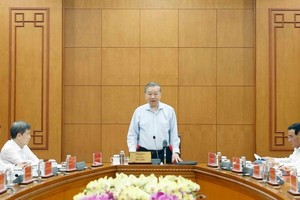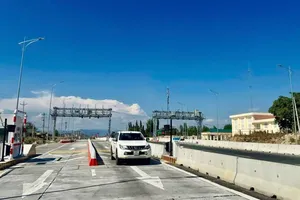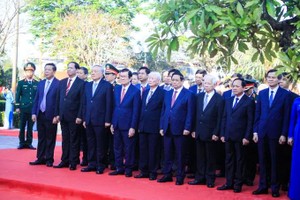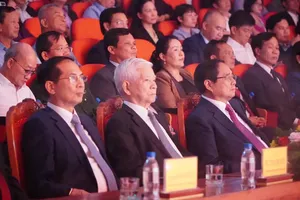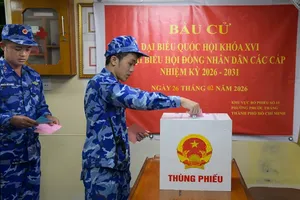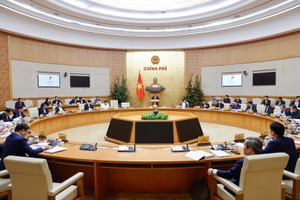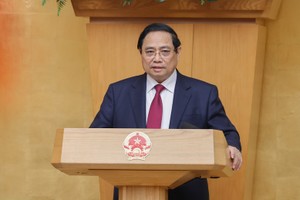
Waste isn’t an abstract concept. It can sprout from the smallest details like a poorly worded legal document to a colossal, multi-trillion-VND public project. The Government Inspectorate once highlighted how a single phrase in the Ministry of Transport’s Circular 01/2021 inadvertently caused citizens to shoulder an extra VND350 billion (US$14 million) in unnecessary testing fees for driver’s licenses.
High-profile cases have also come under scrutiny. In March 2025, the Central Steering Committee on Anti-Corruption agreed to monitor several major projects showing signs of egregious waste, including developments by the Vietnam National Cement Corporation (VICEM), the Hoi Xuan Hydropower Plant project (Thanh Hoa Province), and the new Ministry of Foreign Affairs headquarters.
The recent administrative consolidation of provinces has presented another monumental challenge: what to do with the massive surplus of public assets. Initial statistics show over 4,220 surplus government headquarters nationwide. In the newly expanded HCMC, the number is substantial. Many of these are large-scale properties in prime locations.
To preempt waste, HCMC is already proposing proactive solutions. The former administrative center of Ba Ria – Vung Tau Province, for instance, has been proposed for conversion into a university campus. The twin towers of the former Binh Duong Province Administration Center could see one tower retained for government use and the other transformed into a science and innovation hub. These ideas reflect a concerted effort to “turn surplus into usefulness”.
While these proposals are timely, waste remains a systemic risk nationwide. This is why a fundamental law with clear principles for accountability is so critical. The new draft law, expected to be presented to the National Assembly soon, contains several new provisions designed to tackle these very issues.
“The Party and State’s policy against waste is not new,” commented Lawyer Ha Hai, Vice Chairman of the HCMC Bar Association. “But as the country develops and material resources become more abundant, the risk of waste also grows. Therefore, this policy must be reinforced with effective preventative solutions.”
He argued that the fight against waste cannot rely on appeals alone; it must be codified into law with specific definitions, a clear list of prohibited acts, and strong sanctions, ranging from administrative penalties to criminal charges for serious, repeated offenses.
The cornerstone of the new draft law is the focus on personal accountability. At a recent hearing, the National Assembly’s Economic and Financial Committee proposed explicitly enshrining the principle that leaders must face disciplinary action, dismissal, or resignation if serious waste occurs on their watch.
Head Cao Thanh Binh of the Culture and Social Affairs Committee of the HCMC People’s Council strongly supported this, arguing that vague laws are unenforceable. “Even in HCMC, despite our best efforts, many public buildings sit empty and numerous projects remain stalled for years,” he pointed out. “If the law is clear and specific, managers and leaders will be held to a higher standard and can no longer evade responsibility.”
The key, according to National Assembly Deputy Duong Ngoc Hai, is the principle that “the head bears personal responsibility”. He believes this will motivate leaders to be proactive in preventing waste. However, he also stressed the need for a viable mechanism to protect information providers and a clear framework for calculating and assigning compensation for damages so as to strengthen social trust.
This draft law represents a crucial opportunity to close the loopholes in accountability. When personal responsibility is tightened, every budget dong, every public asset, and every project will be managed and utilized more effectively.
National Assembly Deputy Tran Kim Yen, former Chairwoman of the Inspection Committee of the HCMC Party Committee, commented that compared to the 2013 Law on Thrift Practice and Anti-Wastefulness, the outstanding new point of the draft Law on Thrift Practice and Anti-Wastefulness (revised) is that when an agency or unit causes waste, the head cannot “stand aside” but must bear ultimate responsibility.
The fact that the law clearly states the forms of discipline, dismissal, and resignation, as proposed by the National Assembly’s Economic and Financial Committee, is a strong message, showing that authority goes hand in hand with responsibility. The higher the position, the more exemplary one must be. It also clearly shows a culture of resignation when officials do not fulfill their duties, causing loss and waste.
If this can be added and for this regulation to come to life, it is first necessary to clearly define what is “waste”, “serious waste”, or “very serious waste”, based on specific levels of financial and asset damage and social impact, to avoid arbitrary application. Secondly, the handling process must be clear, ensuring fairness, with the level of violation corresponding to the level of discipline, dismissal, or resignation; simultaneously, it must be made public for the people to supervise.
On the other hand, it is necessary to uphold the responsibility of the head, the responsibility in the process of performing public duties, not just “jointly” but must be disciplined accordingly if loose management leads to waste. Along with that is the need to strengthen surprise inspections and checks in areas prone to waste such as public investment, asset procurement, and management of land and public assets.
When there is a clear and drastic mechanism, officials will naturally raise their sense of responsibility, sense of thrift, and prevent violations right from the planning, implementation, and organization stages. And these regulations will become an effective “disciplinary barrier”, contributing to building an integrity-driven apparatus that serves the people.

